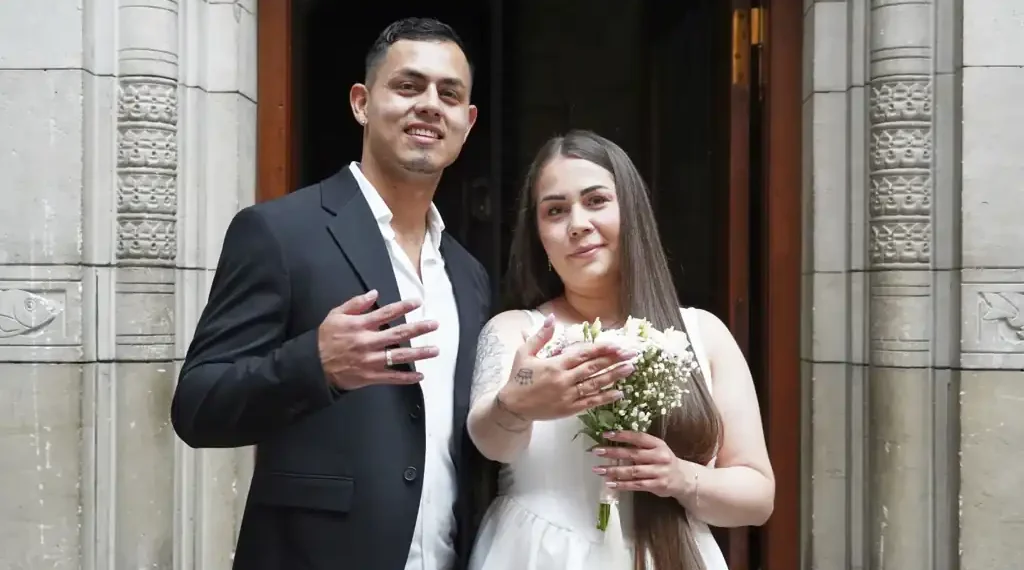Copenhagen Limits Foreign Wedding Bookings Amid Global Marriage Boom
Written July 29, 2025, 15:45 EST
Denmark’s liberal marriage laws have turned the country—especially Copenhagen—into a magnet for international couples seeking quick and uncomplicated weddings. But as demand surges, the city is now taking steps to ensure local residents aren’t pushed out of the queue.
Copenhagen: A European wedding hotspot
Magdalena Kujawińska of Poland and her Colombian fiancé, Heinner Valenzuela, faced daunting bureaucracy in their home country. So they opted to get married in Denmark instead. The couple traveled from Krakow to Copenhagen after hearing about the city’s reputation for relaxed marriage laws and swift approval times.
“We realized it’s not that easy to get married in Poland,” said Kujawińska while waiting for her brief civil ceremony at Copenhagen’s historic City Hall. “We needed a certificate proving we’re not married, but getting it from Colombia and having it accepted in Poland was just impossible.”
After turning to an online wedding planner, the couple submitted their paperwork and were approved within four days. “It’s been more than three years since we got engaged,” she added. “This finally feels right.”
Why couples from around the world choose Denmark
Denmark’s straightforward marriage system attracts thousands of international couples every year—including both mixed-nationality and same-sex couples.
In 2024, about 8,000 ceremonies were performed at Copenhagen City Hall alone. According to Anita Okkels Birk Thomsen, head of the marriage office, approximately 5,400 of those involved couples in which neither partner lived in Denmark.
“That’s almost double the number we saw five years ago,” she told reporters. “They come from all over the world.”
This popularity has led many to nickname Copenhagen “the Las Vegas of Europe” for destination weddings—minus the Elvis impersonators.
City officials want to protect access for locals
The growing influx of foreign couples is creating unintended consequences. Copenhagen’s City Hall now faces more requests than available wedding slots.
Mia Nyegaard, the Copenhagen official in charge of culture and leisure, said in a statement to the Associated Press that the “significant rise” in demand from non-resident couples is making it difficult for local residents to schedule their own ceremonies.
To address the issue, the city plans to reserve about 40% of all City Hall wedding slots for Copenhagen-based couples starting at the end of October 2025.
While this will limit access to foreign couples, they can still get married in Denmark by arranging a ceremony through a private registrar, which remains unaffected by the new policy.
City lawmakers are also expected to consider additional measures after the summer break to ease the pressure on City Hall’s wedding capacity.
Denmark’s liberal marriage laws stand out in Europe
Denmark is widely regarded as one of the most progressive countries when it comes to marriage laws. In 1989, it became the first country in the world to legally recognize same-sex civil unions. Same-sex marriage was officially legalized in 2012.
Unlike many European nations, Denmark does not require a birth certificate or proof of single status in most cases. Couples can obtain a marriage certificate valid for four months with relatively little paperwork.
While Danish officials might request a civil status certificate in cases of ambiguous divorce documentation, the requirements are far more relaxed than in other EU countries.
Couples only need a valid passport and, if applicable, a tourist visa to be eligible. Applications submitted to Denmark’s Agency of Family Law cost 2,100 kroner (about $326) and are typically processed within five business days.
Online wedding planning is fueling the boom
Rasmus Clarck Sørensen, director of Getting Married in Denmark, has built a successful business helping foreign couples navigate the system.
“People ask us, ‘Are you sure we don’t need a birth certificate?’ and we always reassure them—yes, it’s that simple here,” said Sørensen, who launched the company with his British wife in 2014.
His company’s “Complete Service” package costs around 875 euros ($1,014) and includes assistance with document collection, processing the marriage application, and scheduling the ceremony.
According to the business, they supported over 2,600 weddings in Denmark last year alone.
“The problem is, marriage laws in most countries weren’t designed for international couples,” Sørensen explained. “People now meet across borders more than ever before, but the bureaucracy hasn’t kept up. Denmark offers a workaround.”
Copenhagen remains Denmark’s most in-demand wedding city
While non-residents can get married anywhere in Denmark, Copenhagen remains by far the most popular destination. Its size, infrastructure, and excellent transport connections make it the most accessible choice for international visitors.
So far, it’s also the only Danish city experiencing significant strain from the rise in wedding demand.
Any new limits or reforms that Copenhagen adopts will likely be watched closely by wedding planners, travel agencies, and couples around the world looking for marriage-friendly destinations.
Celebrations go on for couples who made it in time
The upcoming changes will not affect couples like Kujawińska and Valenzuela, who completed their ceremony before restrictions take effect.
“It means a lot for us because we’ve been waiting a long time for this,” Kujawińska said. “We’re really happy.” The pair is now focused on organizing a follow-up celebration in Poland with family and friends.
This article was rewritten by JournosNews.com based on verified reporting from trusted sources. The content has been independently reviewed, fact-checked, and edited for accuracy, neutrality, tone, and global readability in accordance with Google News and AdSense standards.
All opinions, quotes, or statements from contributors, experts, or sourced organizations do not necessarily reflect the views of JournosNews.com. JournosNews.com maintains full editorial independence from any external funders, sponsors, or organizations.
Stay informed with JournosNews.com — your trusted source for verified global reporting and in-depth analysis. Follow us on Google News, BlueSky, and X for real-time updates.













